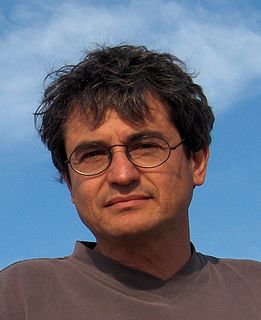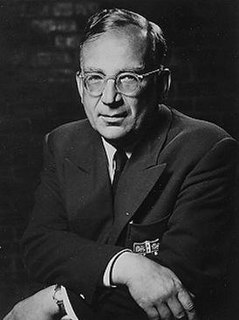A Quote by Carlo Rovelli
Einstein’s 1905 paper came out and suddenly changed people’s thinking about space-time. We’re again in the middle of something like that. When the dust settles, time—whatever it may be—could turn out to be even stranger and more illusory than even Einstein could imagine.
Related Quotes
Even the great scientists have reported that their creative break-throughs came at a time of mental quietude. The surprising result of a nationwide inquiry among America's most eminent mathematicians, including Einstein, to find out their working methods, was that thinking 'plays only a subordinate part in the brief, decisive phase of the creative act itself'.
Much later, when I discussed the problem with Einstein, he remarked that the introduction of the cosmological term was the biggest blunder he ever made in his life. But this "blunder," rejected by Einstein, is still sometimes used by cosmologists even today, and the cosmological constant denoted by the Greek letter ? rears its ugly head again and again and again.
Flying has changed how we imagine our planet, which we have seen whole from space, so that even the farthest nations are ecological neighbors. It has changed our ideas about time. When you can gird the earth at 1,000 m.p.h., how can you endure the tardiness of a plumber? Most of all, flying has changed our sense of our body, the personal space in which we live, now elastic and swift. I could be in Bombay for afternoon tea if I wished. My body isn't limited by its own weaknesses; it can rush through space.
Yet as I cast my eye over the whole course of science I behold instances of false science, even more pretentious and popular than that of Einstein gradually fading into ineptitude under the searchlight; and I have no doubt that there will arise a new generation who will look with a wonder and amazement, deeper than now accompany Einstein, at our galaxy of thinkers, men of science, popular critics, authoritative professors and witty dramatists, who have been satisfied to waive their common sense in view of Einstein's absurdities.
Any time you do something, you make decisions about time and space. I wanted those decisions to be out of my hands. I could be dragged, carried along by another person, I could be a receiver. I could be the agent of the overall scheme, but I didn't want to be the agent of the particular action. I could make the ultimate decision that my space is going to change now, but I don't know where it's going to go.
You could give Aristotle a tutorial. And you could thrill him to the core of his being. Aristotle was an encyclopedic polymath, an all time intellect. Yet not only can you know more than him about the world, you also can have a deeper understanding of how everything works. Such is the privilege of living after Newton, Darwin, Einstein, Planck, Watson, Crick and their colleagues.
Akhnaten is kind of a dark, kind of mysterious character. We don't know a lot about him - a lot of information on him was lost. But he obviously was a kind of iconoclast of him time. I guess I'm attracted to people like that. Like [Albert] Einstein also, who radically changed our way of thinking about the world we live in.
I'm still happy with the way Einstein's Dreams came out. That book came out of a single inspiration. I really felt like I was not creating the words, that I was hearing the words. That someone else was speaking the words to me and I was just writing them down. It was a very strange experience. That can happen with a short book. I don't think it could happen with a long book.





































